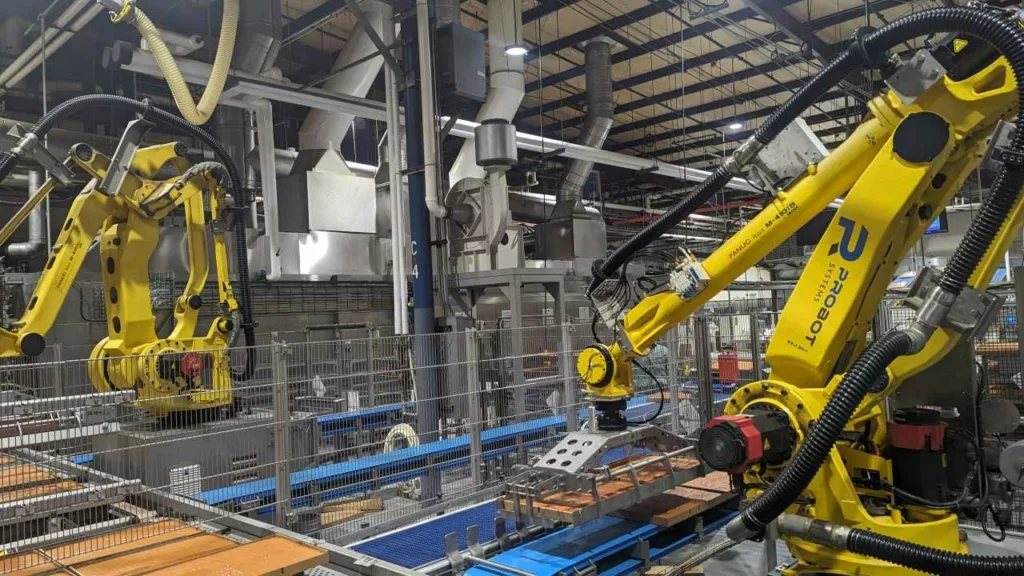Industrial Automation
Want to improve your production? We're here for you!
Find out how our industrial automation solutions can revolutionize your production line.
Benefits of Industrial Automation
Industrial automation is engineered to elevate production levels, diminish labor costs, and enhance product quality, setting a new standard in manufacturing efficiency. Innovations in automation, including the use of robots, reduce energy consumption and waste.
The benefits are manifold:
- Increased productivity and output: Automation enables higher production rates and continuous operation, boosting output considerably.
- Cost efficiency: Substantial reduction in labor costs, particularly in regions where costs are rising sharply, and mitigation of the impact of labor shortages thanks to system automation.
- Improved quality and safety: Automation ensures consistent product quality with fewer defects, and creates a safer working environment by eliminating repetitive and hazardous manual tasks, notably through the integration of collaborative robots.

The main aim of industrial automation is to increase the speed and precision of manufacturing and production processes. By employing automated systems and collaborative robots, repetitive tasks can be performed with greater precision and speed than human workers, minimizing the likelihood of errors and increasing overall production efficiency.
Industrial automation covers several key aspects, including :
- Process optimization: By integrating automated systems, workflows are streamlined, speeding up production cycles while maintaining high quality standards.
- Increased precision: Collaborative robots and other automated equipment can perform tasks with millimetric precision, reducing variations and defects in production.
- Reduced costs: System automation lowers labor costs and increases output, while reducing downtime and material wastage.
- Improved safety: By automating hazardous or repetitive tasks, risks to human workers are considerably reduced, creating a safer working environment.
- Flexibility and adaptability: Automated systems can be quickly reassigned to different tasks or product lines, offering great flexibility to meet changing market needs.
By integrating industrial automation solutions and collaborative robots, you can transform your operations and achieve new levels of productivity and competitiveness. Contact us to find out more about our automation solutions and how they can benefit your business.
In the industrial environment, robots and automated systems are essential for material handling, including tasks such as moving, packaging, and selecting products. They automate the transfer of parts between equipment, optimizing workflows and increasing operational efficiency.
The integration of collaborative robots (cobots) and industrial robots offers several major advantages:
- Reduction of direct labor costs: Robots take over repetitive tasks, freeing employees for higher-value activities and reducing labor requirements.
- Improvement of operational safety: By eliminating repetitive and dangerous tasks, robots create a safer work environment, minimizing the risk of accidents and injuries.
- Increase in efficiency and precision: Robots operate with superior speed and accuracy, ensuring consistent quality and reducing human errors.
- Optimization of production processes: Robots automate the transfer of parts and materials between equipment, speeding up processes and minimizing downtime.
System automation with industrial and collaborative robots is a strategic investment that transforms industrial operations, boosts productivity, and ensures high-quality standards. Contact us to discover how our robotic solutions can revolutionize your production processes and meet your specific needs.
The objectives of industrial process automation encompass several essential aspects:
Enhancement of Workforce Productivity: Automation aims to free workers from repetitive, non-value-added tasks, enabling them to focus on higher-value activities, thus increasing overall efficiency and productivity.
Reduction of Overall Costs: By automating processes, companies can cut labor costs, minimize errors and defects, optimize resource utilization, and streamline operations, resulting in significant long-term savings.
Improvement of Product Quality: Automation ensures more consistent and precise production, reducing variations and defects, resulting in higher-quality end products and increased customer satisfaction.
Extension of Equipment Lifespan: By maintaining efficient and regular use of equipment, automation helps prolong their operational lifespan, thus optimizing capital investments.
Savings on Consumables and Raw Materials: Through more efficient use of raw materials and consumables, automation reduces waste and losses, leading to substantial cost savings.
Enhancement of Production Operation Safety: By eliminating hazardous and repetitive tasks, automation helps create a safer work environment, reducing the risks of accidents and injuries for workers.
By pursuing these objectives, industrial automation offers significant benefits to companies, enabling them to streamline operations, enhance competitiveness, and thrive in an ever-evolving business environment. Contact us to discover how our automation solutions can meet your specific needs and transform your business.



